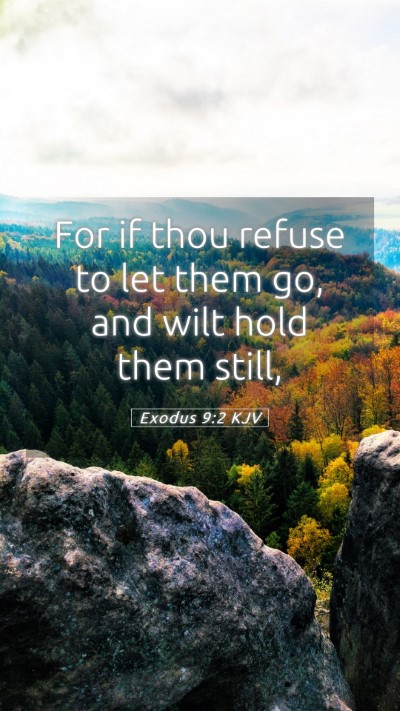Commentary on Exodus 9:2
Verse Context: Exodus 9:2 states: "If you refuse to let them go and continue to hold them back, the hand of the LORD will bring a terrible plague on your livestock in the field – on your horses, donkeys and camels, on your cattle, sheep and goats."
This verse is set in the context of God's covenant with Israel and the impact of Pharaoh's hardened heart during the Exodus. The series of plagues serves as a divine demonstration of God's power and a warning to Pharaoh regarding the consequences of disobedience.
Summary of Interpretations
Exodus 9:2 recounts God's command to Pharaoh through Moses, emphasizing the severity of his refusal to heed God's warnings. The verse highlights several critical themes in biblical understanding:
- Divine Authority: This verse reflects God's sovereignty over Egypt and the world. God’s repeated calls for the release of the Israelites and Pharaoh's stubbornness indicate the tension between divine authority and human defiance.
- Consequences of Disobedience: The impending plague hints at the serious repercussions of ignoring God's commands, which serves both as a warning and a manifestation of God’s judgment.
- Call to Repentance: This verse can be viewed as an invitation for Pharaoh to repent and submit to God’s will, but his refusal leads to further judgments.
Insights from Public Domain Commentaries
Matthew Henry's Commentary
Matthew Henry notes that the verse illustrates “the hand of the LORD” as a metaphor for divine intervention. He emphasizes that God’s warnings serve not only to inflict punishment but also to call the sinners to repentance. Henry elaborates on the importance of heeding God’s call, warning that persistent rebellion leads to harsher judgments.
Albert Barnes' Commentary
Albert Barnes discusses the significance of the livestock in the agricultural society of Egypt, indicating that the threat to these animals represents both economic loss and divine retribution. He stresses that this plague is significant as it targets something integral to Egypt’s wealth and sustenance, thus demonstrating God’s overarching authority over prosperity and suffering.
Adam Clarke's Commentary
Adam Clarke provides a detailed explanation regarding the nature of the plagues, suggesting that they serve as both a warning and an instrument of divine justice. Clarke highlights that beasts were often associated with idolatry in Egypt; thus, the affliction of livestock serves a dual purpose of judgment against the Egyptians’ religious practices.
Conclusion
Exodus 9:2 stands as a potent reminder of God's expectations of obedience and the serious ramifications of refusing to comply. The call to Pharaoh serves as a mirror reflecting humanity's need to recognize divine authority and turn from rebellion toward repentance.
Cross References
- Exodus 5:1: The initial demand for the Israelites’ release.
- Exodus 7:14-24: The first plague of blood on the Nile.
- Exodus 8:1-4: The plagues of frogs and gnats.
- Romans 1:21-23: Humanity’s rebellion against God.
- Hebrews 3:15: A warning against hardening hearts.
Further Reflection
For those involved in bible study groups or participating in online bible study, this verse offers rich insights for discussion focused on applying Bible verses to daily life. Understanding the context and significance of God’s warnings can enhance our biblical literacy and spiritual growth.
In summary, the importance of bible verse commentary in understanding verses like Exodus 9:2 cannot be overstated. It helps believers grasp God's character, His expectations, and the profound meanings embedded in scripture.


